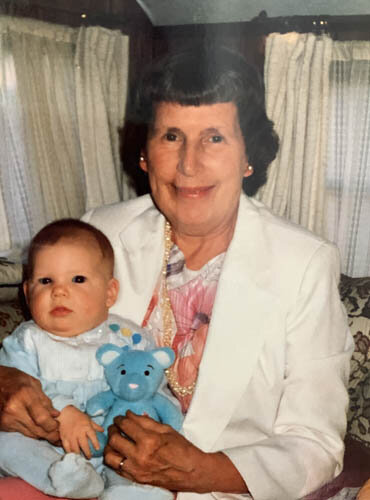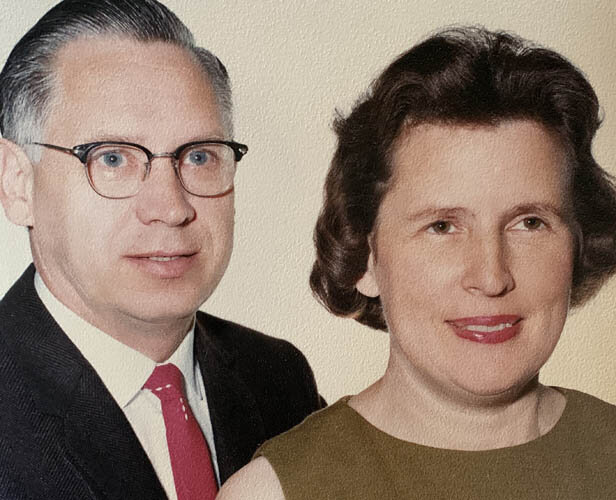Parents as Role Models
Bob and Marion Hayek
-Parents as Role Models-
Have you ever noticed that many children appreciate their parents a lot more after they have moved out on their own? Those parents who seemed so old-fashioned and lacking in understanding to their teen-agers, begin to seem like loving fonts of wisdom, once that angry, frustrated child is faced with cooking a healthy meal, signing a lease, negotiating a car loan, or making household repairs. That was certainly true for me.
My childhood temper tantrums and mysterious upset stomachs, that would go away when certain demands were met, gave way to a teenager’s refusal to go on a family vacation, an accusatory letter claiming my parents never understood me, and a demand to attend a college that was unacceptable to my parents. Conflicts continued during college when I wanted to attend a week-long program at Fisk University (which my parents thought would be dangerous), and later returned from a study abroad program and wanted permission to participate in a second similar program in a different part of the world. The conflict became nasty enough that my mother flew out to Minnesota mid-term to attempt to settle the conflict. My anger at my parents began to subside when my college friends told me what a great mom I had. In a very short time I became embarrassed to have been so frustrated with her. My friends saw things I had not been appreciating.
With my parents gone from the earth for over twelve years and the time for reflection provided by the need to stay home during the pandemic, combined with the luxury of retirement income, I’m again experiencing a renewed appreciation of my upbringing, not so much in regard to cooking or other household skills, but in regard to attitudes toward society and citizenship.
While my parents and other close family members were lifelong Republicans, who never missed voting in an election, and were not social or political activists, they nevertheless always modeled fairness, compassion, and open-mindedness in their relationships to others. Throughout their marriage they were active in the Presbyterian Church, sympathetic to, and sometimes actively involved in, community outreach programs, including the settlement of refugees. Unlike some other church members, they never questioned the propriety of their minister taking time off to travel to the south to engage in activities in support of the civil rights movement.
In conjunction with a program at the University of Washington, my parents hosted foreign students in our home for overnight stays and shared meals. Among other students, I remember visitors from South Korea and the Sudan. One Korean family remained lifelong friends. My parents became acquainted with that family when I brought a Korean student home for dinner and an overnight stay because I encountered him lost and confused on the University of Washington campus, where he’d just arrived from Korea and couldn’t find the friend he intended to stay with.
For decades, my mother, as a member of the American Association of University Women (AAUW), participated in a Great Decisions study group, joining with friends to analyze world problems and discuss potential solutions. A member of the organization for over 50 years, she introduced me to her AAUW friends, who twice persuaded me to run for political office and provided reliable help in my campaigns. My parents enrolled my brother in Boy Scouts and me in Camp Fire Girls and my mom served substantial time as a leader in both organizations, while also enabling us to participate in overnight camps. These organizations taught an appreciation of Native Americans, nature and the importance of community service and good citizenship. My first ever plane ride was as a high school student chosen to attend a national Camp Fire Conference in San Francisco!
My father worked as a real estate salesman during the 60’s when there were a lot of issues related to what was referred to as “open housing.” Mercer Island, along with many other communities, had several neighborhoods with restrictive covenants purporting to ban blacks and certain other categories of people. Under the law, my father was obliged to treat everyone the same in regard to showing homes in various neighborhoods. These issues were discussed at home. My dad demonstrated no personal prejudices in those discussions, just a concern that he might inadvertently do something that appeared to show prejudice and get in trouble for that. He understood that, as part of the enforcement of the law, couples of different ethnicities were being sent out to test whether they were treated equally. This process of testing worried him, but he still never voiced any objection to the underlying purpose of the law.
Looking back, I see my parents as role models for respectful and fair conduct toward those of all races. My parent’s open-mindedness on racial and religious issues was occasionally put to the test by my activities. In elementary school I joined a bible study group that met at a friend’s home. My parents were okay with that until I came home with a message that involved intolerance toward a certain category of people. I was not allowed to return to that class.
During high school, I refused to travel with my parents to California for the Rose Bowl, where my brother would perform as part of the Husky Marching Band. (I still dislike football.) My parents agreed that I could stay in the home of a high school classmate, whose Chinese American parents they had never met. My friend and her family welcomed me into their home and I got the added benefit of learning to use chopsticks and appreciating other Asian influences in their home.
During my first year of college I wanted to participate in a Spring Break trip to Nashville, Tennessee, where I would spend a week living in the dorm of historically black Fisk University and attend classes with my roommate for the week. It was 1967, at the height of the civil rights movement. My parents expressed concern for my safety but nevertheless signed the permission form that was required. Following my junior year of college, I had the opportunity to work at the predominantly black Brooklyn YWCA in New York City. My parents supported those plans.
My parents’ church friends also had an influence on me. As a young person I joined an adult study group at church which concerned inner city problems and how they might be remedied. A friend of my parents invited me to participate as a tutor in a reading program in a black church in Seattle. While I did not join in this school exchange, a youth group friend transferred from the nearly all white Mercer Island High School, to the nearly all black Garfield High School to finish her high school studies, as a means to support the goal of integration. My parents and I were impressed with her family’s commitment to civil rights and the value of having classmates of other races.
While my parents were not enthusiastic about my choice of Carleton College, in Northfield, Minnesota (too far away and too expensive), they nevertheless did not stop me from going there and they paid my expenses through four years of college. We didn’t fully realize that by attending that school I would benefit from knowing foreign students from around the world and African American students who were recruited through a special program designed to increase opportunities for inner city kids and also enhance the racial diversity of the school. Two of those students resided in the same area of the dorm where I lived Freshman year. By trusting my selection of a college, my parents opened further opportunities for living with and understanding differences.
I am grateful to my parents and their church and AAUW friends for being role models in regard to respect and equal rights for all people and the importance of community service. I also view the church leaders as both mentors and trailblazers in regard to integration and civil rights. I have come to appreciate this more in recent months as I have been actively participating in study groups related to the Black Lives Matter movement. I’ve discovered that my experience with racial and ethnic diversity during my childhood and young adulthood is much greater than the experiences of many of my friends. Thank you, Mom and Dad!
While I didn’t get well acquainted with the African American students at Carleton, I appreciated their presence and admired their willingness to step out of their own comfort zone to attend school in a small town known as the home of “Cows, Colleges and Contentment,” where all or nearly all of them persevered and obtained their degrees. They were trailblazers and led the way for students who came after them. I am also grateful for those who created and implemented the programs I participated in at Fisk University and the Brooklyn YWCA. Those experiences helped prepare me for a summer job at Camp Fire’s Camp Sealth, where it was my responsibility to supervise many of the “inner city” kids attending camp for the first time on camperships.
At times I may have been a difficult child for my parents to manage, but from the perspective of many years of life experience, I feel fortunate to have been raised in the home I had. When I had my temper tantrums, I remember my father saying that he thought his sweet, kind little girl must have gone away and left someone loud and angry in her place, but he thought his real daughter would come back soon. When I refused to travel with my parents, they trusted my choice of a family to stay with. When my parents could not understand my college preference, they met with the school counselor and allowed her to persuade them I had found an appropriate school. Had my mom not come to visit during my college angry spell, I don’t know how long those angry feelings might have lingered.
Many parents do get “smarter” when their children are grown. It’s all a matter of perspective. My parents could have been viewed as conservative Republican Christians, but behind that label were two intelligent people who had been denied many opportunities during their own childhoods, who had experienced a number of personal tragedies, who did their best, with limited financial resources, to be supportive parents and good citizens of their community. They have left a valuable legacy of service and compassion for their children and grandchildren.
Postscript: This blog post has received more attention than any of the others I have written. Since this is not a profit-making venture, my reward is having people read and respond to what I have written. Thank you for allowing me to share my family with you. To supplement what is written here, I suggest you take a look at two other blog posts: Family Secret - Family Wisdom and Bias Fuels Rage. The first will explain some of the tragedies my parents dealt with before I was born and the second will explain some of my career experiences as an attorney and judge. I welcome feedback. You can send comments through my About page. Some of you may want to Subscribe to my Blog, which you can do by filling out a form on my Subscribe page. I appreciate feedback on what I have already written and also suggestions on topics you think I should explore in the future. My goal is to find topics where my experiences might provide guidance or insight for those with a different perspective.





